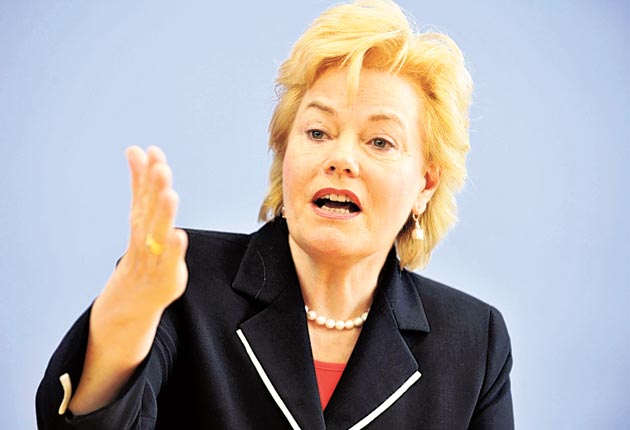Merkel ally quits after claiming Nazis didn't start war

Your support helps us to tell the story
From reproductive rights to climate change to Big Tech, The Independent is on the ground when the story is developing. Whether it's investigating the financials of Elon Musk's pro-Trump PAC or producing our latest documentary, 'The A Word', which shines a light on the American women fighting for reproductive rights, we know how important it is to parse out the facts from the messaging.
At such a critical moment in US history, we need reporters on the ground. Your donation allows us to keep sending journalists to speak to both sides of the story.
The Independent is trusted by Americans across the entire political spectrum. And unlike many other quality news outlets, we choose not to lock Americans out of our reporting and analysis with paywalls. We believe quality journalism should be available to everyone, paid for by those who can afford it.
Your support makes all the difference.In Poland, she remains Germany's most hated living politician. Her unashamedly revanchist political views once prompted a Warsaw news magazine to portray her on its front cover clad in a sinister, swastika-covered Nazi SS uniform.
But yesterday, Erika Steinbach, probably the last surviving bête noire in Chancellor Angela Merkel's conservative government, took the first step towards bowing out of politics altogether after she started an explosive row over who was to blame for starting the Second World War.
Mrs Steinbach, 67, announced her formal departure from the leadership of Ms Merkel's Christian Democratic Party after enraging Germany's Central Council of Jews by inferring that Hitler's invasion of Poland in 1939 was merely a response to Poland's military mobilisation earlier that year.
"I am beginning to get the impression that you can't say what you want in Germany any more, even if one is talking about facts," is how the veteran right-winger responded to criticism from within her own party and its liberal coalition partners about her remarks. A Polish government spokesman said her comments were identical to " Nazi propaganda".
Historians hastened to point out that Poland's mobilisation in early 1939 was a response to the Nazi regime's massive rearmament programme. But Mrs Steinbach maintained she had made her remarks to support her own organisation, Germany's two-million member Expellees' Association, which represents the estimated 12.5 million Germans who were forced out of eastern Europe after 1945.
As the long-serving president of the Association, Mrs Steinbach said she had been backing two members of her board. Days earlier, they had first made remarks about Poland's mobilisation contributing to the start of the Second World War. Mrs Steinbach had refused to distance herself from their comments.
The Expellees' Association was set up after 1945 to represent the millions of Germans who were forcibly evicted from their homes in former German territories that now belong to Russia, Poland and the Czech Republic. Poland and the Czech Republic have been irked by the association's demand that they formally apologise for the post-war expulsion of Germans. They have also been angered by demands that they provide compensation for confiscated German properties or offer Germans a right of return.
In the Cezch Republic, Vaclav Havel the former president and dissident playwright is reputed to have refused to speak to Mrs Steinbach because of her association's stance.
More recently, the expellees have been the source of a blistering row with the government of the late Polish president Lech Kazcynski over its plans to open a museum dedicated to explaining their plight.
Mrs Steinbach maintains that "victor's justice" has prevailed on the expellee issue. In 2008, she told The Independent: "It is especially the wartime victor countries like Britain that have difficulty in accepting the plight of the German expellees."
Yesterday, some members of Mrs Merkel's party voiced fears that Mrs Steinbach's departure under a cloud, from the Christian Democrat's leadership board represented a worrying break with the Expellees' Association which would not only lose the party votes but open the way for the formation of a new right-wing German party.
But many others pointed out that the ageing expellee groups were beginning to lose influence. They interpreted Mrs Steinbach's resignation as an important victory for Ms Merkel, who has suffered her as an uncomfortable party bedfellow for the past decade. Opinion polls have shown that most Germans no longer have much sympathy for expellees.
Steinbach's cause: The group that has reopened old wounds
Germany's Expellees' Association
The group was set up in the aftermath of the Second World War to represent the interests of the estimated 12.5 million Germans who were driven out of central and eastern Europe from the end of 1945.
As the Soviet Red Army advanced, millions of Germans were forced out of the former East Prussia. Millions more ethnic Germans were later expelled from Poland and the former Czechoslovakia. Most expellees fled to West Germany, in some partsaccounting for nearly a quarter of the population.
Germany's conservative Christian Democratic Party said they should be offered a political "home" within the party. But its failure to mention the Holocaust in its charter, its demands for an apology from the Polish and Czech governments and its calls for compensation have continued to hurt Germany's relations with its neighbours, even after the collapse of communism in 1989.
Join our commenting forum
Join thought-provoking conversations, follow other Independent readers and see their replies
Comments